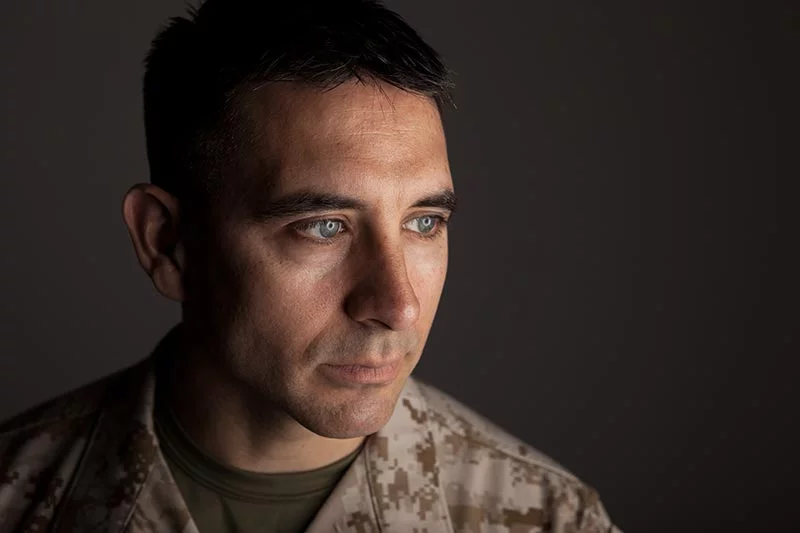
About a decade ago, Lisa Brenner helped conduct interviews at Fort Carson in Colorado Springs with 103 soldiers who had returned from the conflicts in Iraq and Afghanistan. She and her colleagues wanted to understand the physical and emotional effects of the veterans’ deployments. Their responses painted a complicated picture.
“Many of the veterans returned from Iraq and Afghanistan with a mix of symptoms that looked like brain injury and PTSD (post-traumatic stress disorder) together,” said Brenner, a psychologist and researcher at University of Colorado School of Medicine on the Anschutz Medical Campus.
Brenner suspected a link between the mild traumatic brain injuries, or concussions, that many soldiers suffered from explosions and other assaults, and the psychological challenges of PTSD. A growing body of evidence supported her suspicion. Yet while the problems frequently occurred together, the treatments for them stood separately.
“We spent time trying to figure out one or the other instead of treating the whole body,” she said.
A comment from one of the soldiers she interviewed raised another question.
“The soldier talked about his blast injury and said his ‘guts hurt’,” Brenner recalled.
The soldier’s words stuck with her. They opened the door to groundbreaking research that she and her colleagues are conducting to this day. Her goal: understanding how mild traumatic brain injury and PTSD relate and finding ways to treat them together.
Brenner’s search literally spanned the globe. It connected the wounds to body and mind that soldiers suffered on the battlefields of the Middle East, microbes in the East African mud and scientific research on mice afflicted with PTSD-like symptoms.
She found her inquiries continually returned to the natural mix of microbes called the microbiome that dwell in our gut.
A bacterial friend for Veterans with PTSD?
Brenner is now completing a five-year randomized controlled National Institutes of Health-funded study that tests whether a probiotic pill containing a specific bacterial strain can help veterans with PTSD manage their stress.

“PTSD in Iraq and Afghanistan veterans is a significant issue,” Brenner said. “And it doesn’t stop with vets. It is also underrecognized in non-veteran populations.”
The idea is that the strain Lactobacillus rhamnosus GG (LGG) could help to maintain a healthy microbial balance in the gut. A healthy mix of bacteria could, in turn, regulate the immune system and calm the chronic inflammation linked to worsening symptoms of PTSD in veterans with mild traumatic brain injury and gut-related issues, such as inflammatory bowel syndrome, or IBS.
Brenner co-leads the study with her School of Medicine colleague, Christopher Lowry, a pioneering researcher and a professor in the Department of Integrative Physiology and the Center for Neuroscience at the University of Colorado Boulder.
A partnership focused on chronic inflammation
Brenner and Lowry met a decade ago and began collaborating over their mutual interest in understanding possible links between inflammation, the brain and the microbiome. The driving force for Brenner was frustration.
She saw veterans in her clinic “who had no options” for treating their PTSD symptoms, which she believed were often compounded by traumatic brain injury and gastrointestinal problems.

Searching for a new way to help them, Brenner said she delved into the literature that investigated the role of inflammation in exacerbating traumatic brain injury and triggering mental health issues. She discovered a rich repository of studies stretching to the early 2000s and beyond.
The literature spurred Brenner to further investigations, including research into the “gut-brain axis,” the two-way connection between the nerves in the gastrointestinal tract and key centers of the brain that control thinking and emotion.
The price of an imbalance in the gut
Brenner’s reading and research also led her to the “hygiene hypothesis,” an important underpinning for her current study.
The theory holds that people may benefit from exposure early in life to what are considered friendly microbes that help train the immune system to protect itself against stress that leads to allergies and some autoimmune diseases, including inflammatory bowel disease.
In Lowry, Brenner met an important contributor to the hygiene hypothesis. He and colleague Graham Rook published a 2008 paper and co-edited a book that linked physical ailments and mental health issues in developed countries to people being exposed to fewer bacteria and other microorganisms that interact with the immune system.
“The idea is that as we have moved from agricultural lifestyles to urban lifestyles, we’ve lost contact with the organisms that once provided health benefits,” including regulating the immune system, Lowry said.
That microbial loss, in turn, creates imbalances in the gut that put the immune system on hyperdrive and cause chronic inflammation, he said. The result: hypervigilance, chronic anxiety and other symptoms of depression and PTSD.
Mud, mice, PTSD and probiotics
Lowry also contributed important animal research, published in 2007 while he was at the University of Bristol in the United Kingdom, that buttressed the connection between activity in the gut and symptoms of PTSD. That work takes the story to Uganda, and a strain of bacterium dwelling in the mud of Lake Kyoga.
The strain, Mycobacterium vaccae (M. vaccae), led Lowry and his colleagues to what he called a curious discovery. They found that treating mice with the M. vaccae bacterium raised their levels of serotonin, a hormone and neurotransmitter that helps the brain regulate mood and mental health – just as antidepressant drugs like SSRIs (selective serotonin reuptake inhibitors) do.
“In a sense, this bacterium was acting like an antidepressant,” Lowry said. That finding, which came in the early days of investigation into the gut’s importance in overall health, provided a new path for researchers and doctors looking for ways to treat mental health conditions in humans.
A decade later, Lowry and fellow researchers produced more breakthrough work with the M. vaccae bacterium. They developed an experimental model that involved injecting mice with the bacterium, then exposing them for weeks to aggressive rodent neighbors, expecting that the interactions would produce debilitating stress and anxiety.
Instead, the bacterium-treated mice showed fewer symptoms of persistent anxiety and other PTSD-like symptoms than expected. They were also much less likely to develop colitis, a strong indication that the bacterium helped to lower their levels of inflammation.
Lowry’s two studies involving M. vaccae bacterium, mostly begun years before he and Brenner met, were important stepping stones toward their work on probiotics as a possible treatment for PTSD.
A long road to trials of probiotics to treat PTSD
Brenner and Lowry initially co-authored a 2017 review of the available literature on using probiotics to treat traumatic brain injury and PTSD. They found limited evidence to support the effectiveness of the treatments, but called for larger trials to test the idea.
In 2020, the pair and their colleagues began a pilot study of 31 veterans of the wars in Iraq and Afghanistan who had both physical symptoms caused by persistent post-concussive syndrome – a collection of chronic symptoms that can last for months or years after mild traumatic brain injury – and symptoms of PTSD.
The randomized controlled trial divided the veterans into two groups, with one receiving a placebo and the other receiving a probiotic supplement with the bacterium Lactobacillus reuteri.
The trial showed that those who received the probiotic treatment had a decrease in concentrations of plasma C-reactive protein (CRP), an inflammation-driving protein produced by the liver.
Brenner and Lowry followed up the pilot with a 2022 randomized controlled trial of veterans with PTSD. The aim: show if a probiotic supplement with Lactobacillus rhamnosus GG could also reduce levels of CRP.
The 2022 Phase 2 trial was intended to generate more data about the connections between inflammation, the gut, body functions like heart rate and PTSD. It led to the recently concluded trial, which analyzes whether the probiotic treatment could help veterans – and potentially civilians – manage their PTSD symptoms.
Aiming for an additional path to PTSD treatment
Brenner said she wants treatment options for PTSD, not to replace what currently exists. She said that evidence-based psychotherapy works. The problem is that it can be challenging and time-consuming, and, for some veterans, not easily accessible.
On top of that, medication options are limited – the Veteran Administration’s National Center for PTSD recommends only three, and they have physical side effects that can be problematic, Brenner said. By contrast, enrollees in the probiotics trials have found the daily pills are easy to take and well-tolerated, she noted.
She cautioned, however, that people should not rush to their local nutrition store to snap up the many available probiotics. She and Lowry selected Lactobacillus rhamnosus GG for its specific ability to counter inflammation and regulate the immune system at precise doses.
Lowry said neither he nor Brenner considers probiotic treatment a panacea for veterans and others facing PTSD.
“But it could be a tool to put people on a better footing to take the next steps to recovery,” he said.
He added that his work with Brenner demonstrates the value of basic science needed to begin the slow but steady march from the laboratory to treatments that improve human lives.
“It was the preclinical research that led to this trial,” Lowry said. “And I think that regardless of the outcome, the data are overwhelming that some bacterial strains are highly likely to have benefits.”
For her part, Brenner attributed the progress of the studies to veterans who are eager to find alternate routes of treatment for PTSD and brain injuries.
“The trial would be nowhere without them,” she said. “They are incredibly dedicated to finding interventions for themselves and those they served with.”
